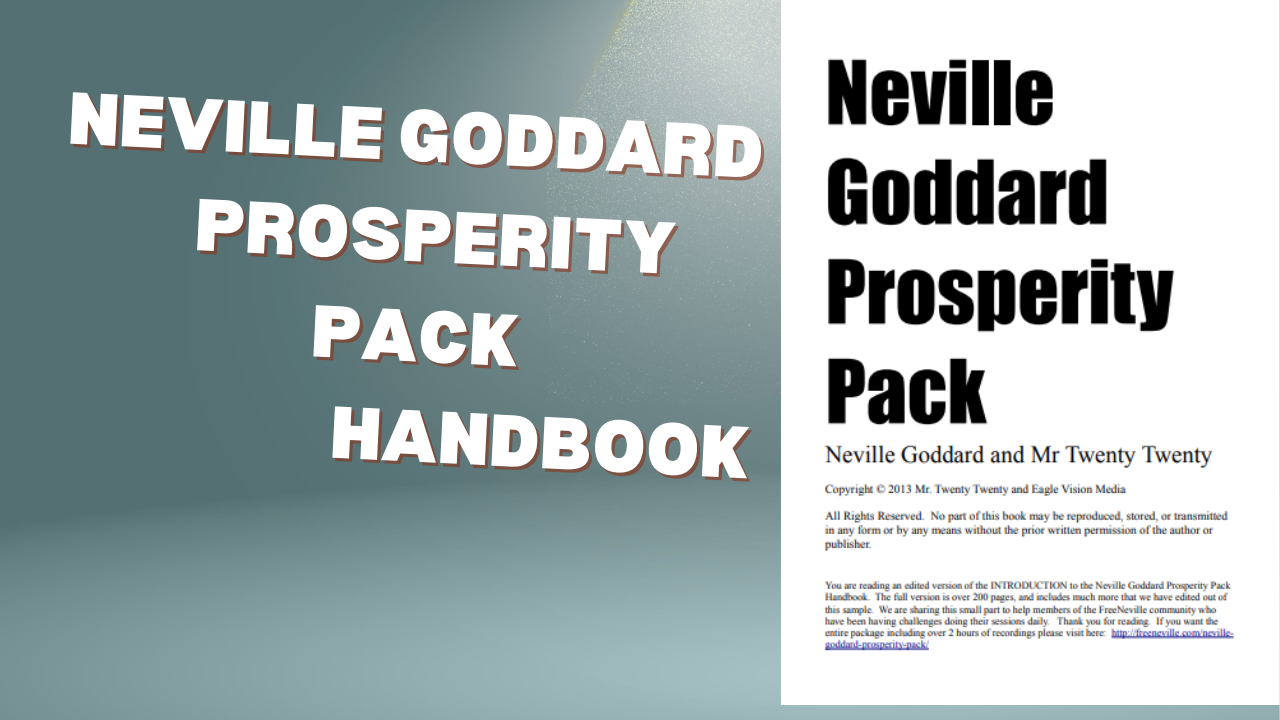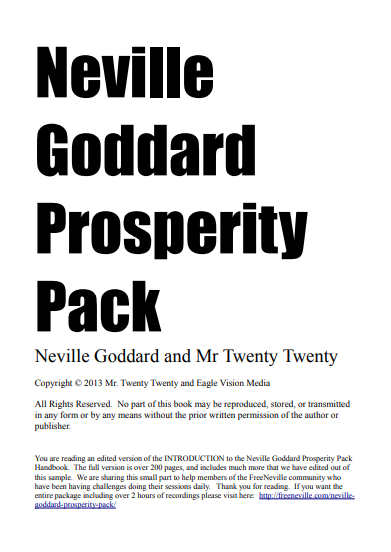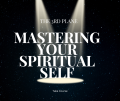
This is an excerpt from the introduction to a Neville Goddard Prosperity Pack handbook, promoting a program designed to help users achieve financial success and well-being. The introduction emphasizes the importance of daily sessions involving visualization and positive affirmations, contrasting the time wasted on unproductive activities with the potential for transformative change through consistent practice. It addresses common reasons for resistance to these practices, including ingrained negative thought patterns and addiction to negative emotions. The program offers techniques for overcoming these obstacles and achieving a state of abundance, incorporating Neville Goddard’s teachings and a structured approach with audio lessons. Finally, it highlights key principles and exercises, including a $10 experiment and fifty-nine audio lessons, to facilitate the process of achieving desired financial and personal success.


Understanding the Principles of Neville Goddard and Manifestation
- What is the core idea behind the “Neville Goddard Prosperity Pack” and its approach to creating a desired reality? The core idea is that your imagination creates your reality. It emphasizes the power of feeling and imagining yourself already in the state of your desired outcome (not just having it). The program focuses on actively choosing your mental state and revising past experiences to cultivate feelings and beliefs that align with your goals, especially financial prosperity and success. The underlying principle is that your consciousness is the creative force, and the external world is a reflection of your internal state.
- Why are daily “sessions” (imaginal exercises) considered crucial, and why do people often resist them? Daily sessions are considered crucial because they are the primary method for actively shaping your inner state and thus, your outer reality. These sessions involve deliberately imagining your desired outcome as already accomplished and feeling the associated emotions. People resist them due to a number of reasons: ingrained “poverty programming” that associates feeling good about wealth with failure, a lack of understanding of the connection between imagination and reality, and addiction to the “chemical soups” associated with negative emotions. There is also the common tendency to be distracted by external entertainment, rather than investing in self improvement.
- What does the program mean by “addiction to crap” and how does it relate to manifestation? “Addiction to crap” refers to the body’s (not your conscious self) tendency to become addicted to the neurochemicals associated with negative emotions (like poverty, complaining, and arguing). This addiction creates a cycle where you unconsciously recreate situations that elicit those familiar, albeit undesirable, feelings. These are often expressed in recurring life patterns. In order to manifest positive change, you must break free from this addiction by changing your core assumptions and deliberately creating the chemical soups associated with your desired states.
- How does the concept of “revision” fit into this process, and what are “resource states”? Revision, in this context, means actively reshaping past experiences in your mind to be what you wished they had been. It is about reshaping your historical day into its ideal version. By consistently revising past situations and your reaction to them, you build “resource states”, which are positive, empowering mental states from past memories that can be used to improve your current mood and actions today. For example, recalling how you were successful in the past and how you reacted to difficult situations can be a form of resource state. It allows you to change how you feel today by drawing from those empowered states.
- What are the key elements or assumptions that one must adopt to effectively use these techniques? The core assumptions to adopt include the belief that: 1) you are not your body, you are consciousness and your body is within you; 2) you are greater than any state and therefore, not bound by current circumstances; 3) everything is a channel, there is a deeper true cause of all things, which is you and your consciousness; 4) your imagination creates reality. Also, understanding that you must choose to be “Jacob” and not “Esau” – you must be the master of your own life and not be controlled by fate or circumstances. It involves consistently choosing a mindset of acceptance and a vision of a new world instead of judging and worrying. Finally, it’s about realizing the body has an addiction and that you are not the body and therefore are not addicted.
- What is the practical advice given for overcoming resistance to daily sessions and shifting to a state of feeling good? The practical advice emphasizes consistency and intention. It encourages daily “feel it real” sessions where you actively imagine your desired outcome, taking only 15-30 minutes a day to actively practice this. It suggests adopting a “hotel phrase” mindset, meaning taking it easy and seeing this process as natural and comfortable. The program encourages that you “walk and sleep in the state of your financial wishes fulfilled.” and to become aware of and change your reactions to external events by reacting as the ideal version of yourself. Ultimately, it is about noticing if you are being Esau or Jacob, and actively deciding if you are going to be the master of your circumstances.
- What does the program suggest is the relationship between thinking you are poor versus thinking you are wealthy, when learning and studying how to achieve wealth? The program proposes that those who are in a “poverty state” often feel ashamed or bad when learning about wealth, because their core assumption is based on a feeling of being poor. Alternatively, those in a “wealthy state” feel good and enjoy learning how to acquire more wealth, because their core assumption is based on a feeling of already being successful. The program suggests that those who are wealthy faithfully use “feel it real” sessions and are often day dreaming and pondering their next big success. They don’t assume only failures use this techniques. It argues that the key is not to assume only “poor people” use sessions to manifest wealth.
- What specific techniques or experiments are referenced in the program to accelerate change? The program references a “fifty-nine audio lessons” series from Neville Goddard lectures that are to be listened to daily and then twice a day for 30 days. There is also reference to a “10$ experiment” that is mentioned in the full package and not specified in this text, however it does mention that this has resulted in massive change for many people. It also suggests a three-step process: Define your ideal self, change your core assumptions, and practice feeling it real. Also, it discusses the importance of revising your day daily and choosing your reactions to external events.
Neville Goddard Prosperity Pack Study Guide
Quiz
Instructions: Answer each question in 2-3 sentences based on the provided source material.
- According to the text, what is the primary reason people resist engaging in daily visualization sessions?
- What does the text mean by “addiction to crap,” and what are its two levels?
- How does the author explain the connection between peptides and “crap soup”?
- Why does the author suggest that looking for “deep hidden beliefs” is the wrong approach?
- What does the text identify as the two key changes needed to overcome the addiction?
- What three actions are recommended to become free from the “crap soup” addiction?
- What are resource states and how can they help you in the present moment?
- What are the two questions that will activate your prosperity power, according to the text?
- What are the four core assumptions that are included in every Neville Goddard prosperity teaching, according to the text?
- What does the text suggest regarding the $10 Experiment?
Quiz Answer Key
- The primary reason people resist daily sessions is the misconception that only failures engage in imagining success. They are often addicted to “crap” and/or being distracted by it and find it difficult to engage in the process.
- “Addiction to crap” refers to being drawn to negative or undesirable states and experiences. It has two levels: addiction to constant crap, and addiction to cycles of crap, where negative experiences alternate with positive ones.
- Peptides, or “molecules of emotion,” are released when we experience feelings. The body can get addicted to the chemical soups associated with negative emotions.
- Looking for deep hidden beliefs is unproductive because the issue is not in the past, but rather in one’s current assumptions and the resulting chemical addiction.
- The two changes are to stop feeding the addiction to “crap soup” and to change one’s core assumptions about oneself, life, and God.
- To overcome the addiction, one must be faithful to their sessions, notice how they are reacting to the world and react as the ideal they wish to be, and revise their historical day.
- Resource states are past experiences and memories that contain positive and useful qualities, and remembering them can help improve one’s present performance, and states.
- The text does not explicitly state what the two questions are.
- The text only indicates that there are four core assumptions, but does not explicitly list what they are.
- The $10 experiment is a practical exercise (detailed in the full package) that is intended to bring massive change in people’s lives with just the right attitude and $10.
Essay Questions
- Discuss the concept of “addiction to crap” as presented in the text, including its different levels and the underlying mechanisms, and analyze why the author considers it a significant obstacle to applying Neville Goddard’s principles.
- Explain how the concept of “resource states” can be used to improve one’s life, according to the text and how they relate to the larger goal of achieving the desired state.
- Analyze the key arguments the text provides as to why people resist doing their daily sessions, and discuss the strategies that the author proposes to overcome those barriers.
- Neville Goddard’s teachings emphasizes that “consciousness is the only reality.” Evaluate the text and its discussion of the role of the body in hindering one’s progress toward living in the end, and identify the core assumptions that need to be changed.
- Critically evaluate the “three-step formula” of the text and explain how these practices work together, and analyze the effectiveness of the text’s arguments, supporting your points with examples from the text.
Glossary of Key Terms
Addiction to Crap: The tendency to gravitate towards and experience negative or undesirable states of being; a dependence on the chemical soup created by negative emotions. Cycles of Crap: A stage of progress where negative experiences manifest in a predictable, cyclical manner, alternating with positive ones. Constant Crap: A state of existence where one’s focus is almost entirely on negative thoughts and experiences. Crap Soup: A metaphor for the chemical soup of peptides related to negative emotions, which the body craves as an addiction. Feel It Real Sessions: Daily visualization exercises where one imagines the desired state as already achieved. Hotel Phrase: A technique to make the feeling of having the desired outcome easy and accessible, like knowing you have a reservation at a hotel. Peptides: Molecules of emotion (also referred to as neuropeptides); chemicals released in the body with the experience of feelings that can create a chemical addiction. Resource States: Positive and useful states derived from past experiences and memories that can be used to improve current performance, mindset and learning. Revision: The practice of reshaping and reimagining one’s historical day as an ideal. State (of Being): The specific feeling and consciousness one assumes at any given moment.






















0 responses on "Neville Goddard Prosperity Pack Handbook"